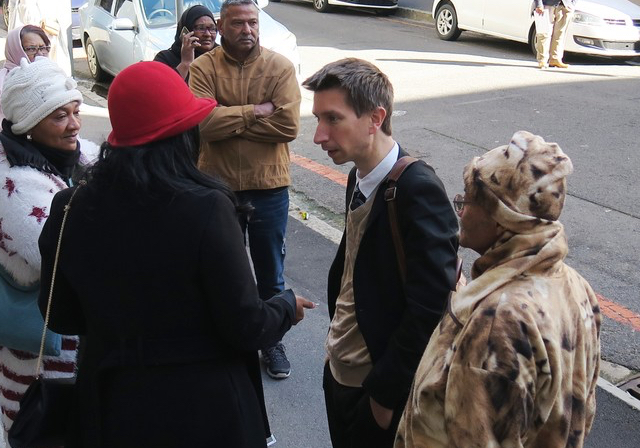Timothy Dunn (centre) speaks to supporters of the River Club development outside the Western Cape High Court in June. Photo: Steve Kretzmann
By Steve Kretzmann
GroundUp
Attorney Timothy Dunn claims on his LinkedIn profile that he has a Master’s degree in Law (LLM) from the University of Cape Town (UCT) obtained in 2016. The claim is false.
Dunn is the lawyer who brought a case to the High Court which accused a First Nations leader, Tauriq Jenkins, of fraud. Jenkins led opposition to the controversial R4.6-billion Amazon development at the River Club in Cape Town.
The university’s badge is displayed above Dunn’s claim. But the university has no record of Dunn’s degree. A search on UCT’s public access portal, where anyone can search for an alumni’s degree so long as they have their name, surname, and date of birth (in Dunn’s case obtained from publicly available court documents), reveals no such qualification for Dunn.
For a third party to obtain more detailed results on a past or present student’s academic records, written consent or power of attorney is required. But, a source within the university confirmed Dunn had registered for a Master’s degree and completed his coursework. As he never completed his dissertation, he did not graduate and does not hold a master’s degree.
This has been confirmed by Dunn who, in response to questions, said he has “half the masters” but never completed the required thesis.
“I am not at all active on LinkedIn and I last updated my profile in 2016 when I was doing the masters courses and part of the never finished thesis as my practice was taking too much time,” was Dunn’s explanation.
He added: “I do not use LinkedIn for any purpose and have never done so.”
But LinkedIn is widely used by people when they are seeking services, such as those of an attorney.

Screenshot of Dunn’s LinkedIn profile
And misrepresenting your qualifications on social media is a criminal offence in terms of the National Qualifications Framework Amendment Act 12 of 2019, with a possible jail term of up to five years.
Nombuso Zama, associate at Tomlinson Mguni James Attorneys, states in an article on the firm’s website: “The new law does not just limit the offence to lying on a job application, but has extended it to lying on social media platforms like LinkedIn, Facebook, Twitter, etc.”
Zama, when called for further information, said misrepresentation on LinkedIn has since been quoted in a labour case in which the person misrepresented themselves as having a driving licence. She said it is unlawful to post a qualification you don’t have, and in the case of a legal practitioner, it also contravenes the Legal Practice Council’s code of conduct.
A number of politicians and senior executives, mostly in government parastatals, have since been caught making false claims about their qualifications.
Complaint with Legal Practice Council
A complaint unrelated to the misrepresentation of his qualification has been laid against Dunn with the Legal Practice Council by the Willow Arts Collective (WAC), a group of about 30 people who occupy the former National Circus School grounds at 2 Willow Street in Observatory. The land is owned by the City of Cape Town. The collective were represented pro bono by Dunn in opposing eviction proceedings brought by the City until the collective terminated his involvement in August last year. The Cape Town Magistrates’ Court has since ruled they had to leave the property by 31 July.
The collective initiated the complaint against Dunn in August last year. The collective’s chairperson Shayne Taliona stated in the letter of complaint that given there were “few if any” lawyers willing to take their case pro bono, and that they may as a result be stuck without any legal representation in the fight against their eviction, they “do not lay this complaint lightly”.
Taliona wrote that while acting for the collective, Dunn had taken on clients whose interests were in direct conflict with those of the Willow Arts Collective, and had failed to file affidavits to the court on time, prejudicing their case.
The clients, states Taliona, were members of the First Nations Collective which supports the River Club development 700 metres away, who claimed to be legitimate members of the Goringhaicona Khoi Khoin Indigenous Traditional Council (GKKITC). They sought to depose the council’s Supreme High Commissioner, Jenkins, who had been leading litigation against the River Club development, and withdraw the council from legal opposition.
Dunn won a judgment by a full bench in the High Court on 8 November last year.
The judgment handed down by Judge Elizabeth Baartman rescinded an 18 March 2022 judgement by Deputy Judge President Patricia Goliath’s which halted the River Club development on the basis of insufficient consultation with First Nations people such as the Goringhaicona. Baartman stated Goliath’s judgement had been obtained by fraud on Jenkins’s part.
Dunn’s response to the complaint was that the River Club and former circus school property at 2 Willow Road were unrelated, that his involvement in the River Club matter had nothing to do with the development but was “limited to acting for a first nation client and its tribe members who have been hijacked and a victim of fraud” who “happen to mostly be in support of the River Club development”.
Follow African Insider on Facebook, Twitter and Instagram
Picture: GroundUp
For more African news, visit Africaninsider.com


